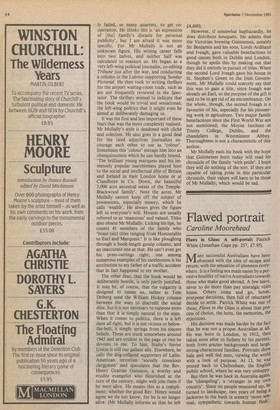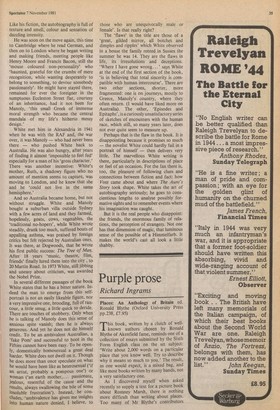Flawed portrait
Caroline Moorehead
Flaws in Glass: A self-portait Patrick White (Jonathan Cape pp. 257, £7.95) Many successful Australians have been obsessed with the idea of escape and return; with the sensation of alienness everywhere. It is a feeling not made easier by a pervasive hostility of native Australians towards those who make good abroad. A few leave, never to do more than pay nostalgic visits home. Others come and go, hover, postpone decisions, then full of reluctance decide to settle. Patrick White was one of these; Flaws in the Glass is about that process of choice, the lures, the memories, the rejections. His decision was made harder by the fact that he was not a proper Australian at all. He was born in London, in 1912, then taken soon after to Sydney by his parents, both from grazier backgrounds and large, strong-charactered families. Portraits show hale and well fed men, viewing the world with a look of purpose. At 13, he was posted back to Cheltenham, the English public school, where he was very unhapPY. But then he was back in Australia again, the 'changeling', a 'stranger in my own country'. Since no people measured up, he turned to landscape, two years of being a jackeroo in the bush in scenery 'more sensual, sympathetic towards human flesh Like his fiction, the autobiography is full of texture and smell, colour and sensation of dazzling intensity.
He was soon on the move again, this time to Cambridge where he read German, and then on to London where he began writing and making friends, meeting people like Henry Moore and Francis Bacon, still the 'mouse coloured non-personality' who 'haunted, grateful for the crumbs of mere recognition, while wanting desperately to belong to something, to devour somebody passionately'. He might have stayed there, remained for ever the foreigner in the sumptuous Eccleston Street flat, courtesy of an inheritance, had it not been for Manoly, 'this small Greek of immense moral strength who became the central mandala of my life's hitherto messy design.'
White met him in Alexandria in 1941 when he was with the RAF and, the war over, it was Manoly — who had never been there — who pushed White back to Australia. He was also hungry, after years of finding it almost 'impossible to feel fed' especially for a man of his 'gross character.' There was another incentive: White's mother, Ruth, a shadowy figure who no amount of mention seems to capture, was moving to London, and he knew that she and he `could not live in the same hemisphere.'
And so Australia became home, but not without struggle. White and Manoly bought a suburban villa outside Sydney with a few acres of land and they farmed, hopelessly, goats, cows, vegetables, the 'traditional no-hopers', while White wrote steadily, drank too much, suffered bouts of appalling asthma, was praised by foreign critics but felt rejected by Australian ones. It was there, at Dogwoods, that he wrote his first public success: The Tree of Man. After 18 years 'music, theatre, film, friends' finally lured them into the city , to 20 Martin Road. In 1973 White, still jibbing and uneasy about criticism, was awarded the Nobel Prize.
In several different passages of the book White states that he has a bitter nature. Indeed the man to emerge from this selfportrait is not an easily likeable figure, nor a very impressive one, brooding, full of rancour, a little smug, a little quick to deride. There are touches of snobbery. Only when he is talking of Manoly does this sense of anxious spite vanish; then he is always generous. And yet he does not do himself credit. To be an ambivalent Australian, a `fake Porn' and successful to boot in the Fifties cannot have been easy. To be openly, domestically homosexual a great deal harder. White does not dwell on it. Though he does more than once speculate on what he would have been like as heterosexual Cif an artist, probably a pompous one') or woman ('an earth mother,... passionate, Jealous, resentful of the cause and the results, always swallowing the bile of some insoluble frustration'). Instead, he concludes, 'ambivalence has given me insights into human nature denied, I believe, to those who are unequivocally male or female'. Is that really right?
The 'flaws' in the title are those of a 'great, gilded mirror, all botches and dimples and ripples' which White observed in a house the family rented in Sussex the summer he was 14. They are the flaws in life, its irresolutions and deceptions.
'Where I have gone wrong...' says White at the end of the first section of the book, 'is in believing that total sincerity is com patible with human intercourse'. There are two other sections, shorter, more fragmented: one is on journeys, mostly to Greece, Manoly's country, where they often return. (I would have liked more on Australia). The other, 'Episodes and Epitaphs', is a curiously unsatisfactory series of sketches of encounters with the human race, which still, so many years later, does not ever quite seem to measure up.
Perhaps that is the flaw in the book. It is disappointing because it promises so much — the novelist White could hardly fail in a portrait of himself — then delivers very little. The marvellous White writing is there, particularly in descriptions of place or feel of an occasion. For the fan there is, too, the pleasure of following clues and connections between fiction and fact: how Voss came about and where The Aunt's Story took shape. White takes the art of autobiography seriously; he goes to conscientious lengths to analyse possibly formative sights and to remember events where his imagination was caught.
But it is the real people who disappoint: the friends, the enormous family of relations, the perception of strangers. Not one has that dimension of magic, that luminous sense of the possible of a Himmelfarb. It makes the world's cast all look a little shabby.



























































 Previous page
Previous page